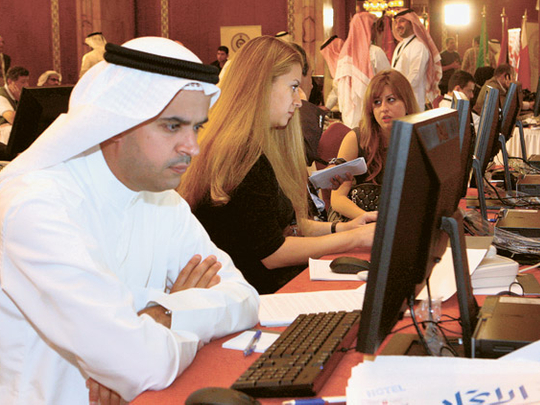
Abu Dhabi: Shaikh Hamdan Bin Mubarak Al Nahyan, Minister of Public Works and Chairman of the National Media Council, stressed that the 31st GCC Summit, which began on Wednesday, is a significant step towards political, economic, security and cultural integration among member states of the Gulf Cooperation Council (GCC).
"The GCC succeeded in coordinating the media policies of member states and in achieving a unified form, which takes into consideration the Council's basic goals related to radio and TV stations, press, news agencies and external information," Shaikh Hamdan said in a statement to WAM as he inspected the special media centre set up at Intercontinental Hotel, Abu Dhabi, to facilitate coverage of the Summit to be chaired by President His Highness Shaikh Khalifa Bin Zayed Al Nahyan.
Responsibilities
The GCC, he noted, also succeeded in further strengthening coordination among media establishments to achieve the goals and honour its responsibilities towards nationals of member states and their common interest.
He added that joint media action aims to promote nationals' belief in the role being played by member states by providing accurate and immediate information on joint action and also the nationalisation of the media by providing equal opportunities for GCC nationals.
Noting the achievements of the UAE in terms of media and information over the last 39 years, Shaikh Hamdan said this turning point in the history of the press in the UAE promotes the country internationally thanks to the professional and technical developments in institutional media as well as the country's commitment to elevate standards of journalism through continuous training at the world's best specialised centres and the opening of many colleges of information at national universities.
"Figures speak loudly on the UAE achievements where 15 TV channels, 24 radio stations, nine Arab-ic dailies, seven English dailies, WAM and tens of weeklies, monthlies and periodicals operate," Shaikh Hamdan said. "The UAE hosts four media free zones where hundreds of regional and international media outlets operate. Abu Dhabi's media free zone alone hosts 115 media outlets from all over the world while Dubai Media City hosts 875 outlets," he added.
The information technology revolution has served our media plans, domestically and overseas, he said adding that the National Media Council's (NMC) website has made a quantum leap in disseminating multilingual information on the political, economic, social and cultural developments in the UAE.
Bilingual website
He also made a reference to WAM's bilingual website, which provides news in Arabic and English, photos and TV footage.
Shaikh Hamdan further affirmed NMC's commitment to the continuous upgrading of services as well as to the expansion of the use of the internet, which he said is a major part of its strategic planning.
"The UAE believes in the need for openness to other cultures and in introducing its own culture and comprehensive development. Therefore we have special interest in the UAE's participation in the annual events held by GCC in the capital cities of other countries," he said.
He stressed that the GCC aspires for the unification of media policies of member states by discussing rapprochement and similarities to eventually reach a common vision which takes into consideration the basic goals of GCC.











